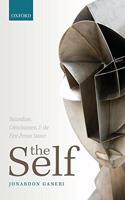
The Self: (Paperback)
Series: Paperback
What is it to occupy a first-person stance? Is the first-personal idea one has of oneself in conflict with the idea of oneself as a physical being? How, if there is a conflict, is it to be resolved? The Self recommends a new way to approach those questions, finding inspiration in theories about consciousness and mind in first millennial India. These philosophers do not regard the first-person stan
NaN
VOLUME
English
Paperback

What is it to occupy a first-person stance? Is the first-personal idea one has of oneself in conflict with the idea of oneself as a physical being? How, if there is a conflict, is it to be resolved? The Self recommends a new way to approach those questions, finding inspiration in theories about consciousness and mind in first millennial India. These philosophers do not regard the first-person stance as in conflict with the natural--their idea of nature is not that of scientific naturalism, but rather a liberal naturalism non-exclusive of the normative. Jonardon Ganeri explores a wide range of ideas about the self: reflexive self-representation, mental files, and quasi-subject analyses of subjective consciousness; the theory of emergence as transformation; embodiment and the idea of a bodily self; the centrality of the emotions to the unity of self. Buddhism's claim that there is no self too readily assumes an account of what a self must be. Ganeri argues instead that the self is a negotiation between self-presentation and normative avowal, a transaction grounded in unconscious mind. Immersion, participation, and coordination are jointly constitutive of self, the first-person stance at once lived, engaged, and underwritten. And all is in harmony with the idea of the natural.About the Author: Jonardon Ganeri, University of Sussex Jonardon Ganeri's work has focused primarily on a retrieval of the Sanskrit philosophical tradition in relationship to contemporary Anglo-American analytical philosophy, and he has done work in this vein on theories of self, conceptions of rationality, and the philosophy of language. He has also worked extensively on the social and intellectual history of early modern South Asia, on the nature of philosophy as a practice, and on the political idea of identity. He is currently Professor of Philosophy at the University of Sussex and Professor of Philosophy at Monash University.Table of Contents: Introduction Part I. Naturalism & the Self Historical Prelude: Varieties of Naturalism 1: Conceptions of Self: An Analytical Taxonomy 2: Experiment, Imagination & the Self Part II. Mind & Body 3: Emergence 4: Transformation 5: Persistence 6: The Self as Bodily Part III. Immersion & Subjectivity 7: The Composition of Consciousness 8: Self-consciousness 9: Reflexivism 10: Sentience 11: Other Minds Part IV. Participation & the First-Person Stance 12: The Mind-Body Problem 13: Attention, Monitoring & the Unconscious Mind 14: The Emotions 15: Unity 16: The Distinctness of Selves Conclusion: A Theory of Self Bibliography Index
Price Comparison [India]
In This Series
Bestseller Manga
Trending NEWS




















